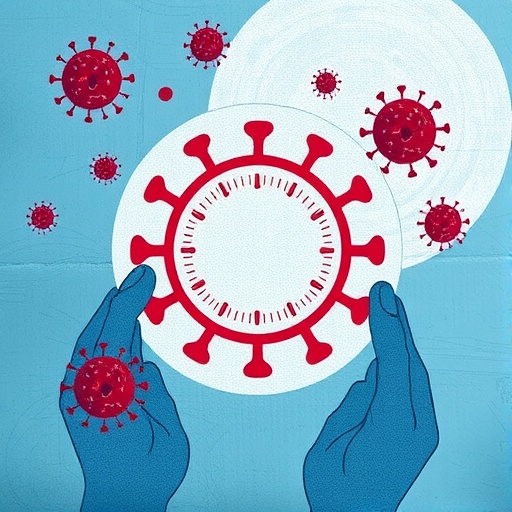The global COVID-19 pandemic has changed the fabric of society, imposing lockdowns that have drastically altered daily life across the globe. One particular demographic that has been notably affected is children and adolescents. Recent research has shed light on the familial mechanisms that link these lockdowns to psychological distress experienced by young individuals, particularly in Singapore. This study, which focuses on Singaporean children and adolescents, dives deep into the familial structure and its role in mediating the impact of such unprecedented events on mental health.
With the implementation of lockdown measures, children and adolescents have faced a barrage of stressors. Isolation from peers, the disruption of daily routines, and the uncertainty surrounding the pandemic have all contributed to an environment rife with anxiety and fear. The study aims to understand how familial interactions can either mitigate or exacerbate these feelings. The researchers argue that close family ties can alleviate some of the distress but may also present unique challenges or strains during such tumultuous times.
The research team conducted in-depth surveys and interviews with families in Singapore over a significant period. The data gathered offers a comprehensive view of familial dynamics during lockdown periods, showcasing the emotional states of both parents and children. Intriguingly, the results indicated that parents’ mental health directly impacts their children. Those parents exhibiting signs of stress and anxiety tended to have children with similar feelings, highlighting the importance of a supportive family environment during crises.
Moreover, the study delved into how the nature of family interactions impacted the psychological outcomes for children and adolescents. Some families reported a strengthening of bonds, where members rallied together to support one another. In stark contrast, others experienced heightened tension and conflict, further exacerbating feelings of distress. This dichotomy presents a fascinating glimpse into how familial contexts can either promote resilience or contribute to vulnerability in young people.
Social support has been a frequently discussed topic throughout the pandemic, particularly regarding its essential role in mental health. The findings from this study reinforce the idea that a solid support system—especially within the family unit—can serve as a protective factor against the psychological fallout of stressful events. However, the researchers also caution that not all familial interactions are beneficial. Families struggling with pre-existing difficulties may find these tensions magnified, leading to increased distress among all members.
In addition to examining the emotional ramifications of lockdowns, the research also surveyed educational impacts related to mental health. With remote schooling becoming the norm, children faced new challenges in adapting to online learning environments. For some, this shift resulted in a disconnection from traditional educational support systems, further contributing to feelings of isolation and anxiety. The study provides invaluable insights into the educational disruptions and how these were intertwined with psychological distress among young students.
Furthermore, the research highlights the importance of parental education and awareness concerning mental health. Families that actively sought resources and strategies to cope with the implications of lockdowns displayed better outcomes. This suggests that access to mental health education and support can play a crucial role in helping families navigate challenging times. The findings underscore the necessity for community programs that provide mental health resources tailored for families experiencing similar stresses.
Despite the adversity faced during the lockdown, some families managed to adapt and implement effective coping mechanisms. The study identified various strategies that families adopted to maintain well-being, such as establishing new routines, engaging in outdoor activities when permissible, and fostering open communication. These methods not only helped mitigate distress but also provided families with a sense of normalcy in an otherwise chaotic environment.
The implications of this research extend beyond Singapore, shedding light on a global phenomenon. It raises critical questions about the long-term impacts of lockdowns on mental health and the role of family systems in addressing these effects. As the world continues to cope with the evolving situation of the pandemic, understanding fundamental familial mechanisms remains key to fostering resilience among children and adolescents.
In a broader context, this study encourages policymakers and mental health professionals to consider the significant influence familial relationships have on youth mental health. By facilitating family-oriented support programs, communities can empower families to create a protective environment for their children. The findings could inform future strategies aimed at minimizing psychological distress in young people during times of crisis.
Overall, this research serves as a poignant reminder of the importance of familial support amid crises. The psychological well-being of children is intricately linked to the health of family dynamics, especially during stressful and uncertain times. As societies rebuild and adapt post-pandemic, prioritizing mental health support for families could lead to more resilient future generations.
The intricate connections explored in this study highlight an urgent need for ongoing research into family dynamics and mental health, especially in the face of global challenges. By fostering a deeper understanding of these relationships, we can better equip future generations to handle life’s adversities and thrive despite difficulties.
As the mental health landscape continues to evolve, integrating findings such as those from this study will be essential in crafting effective mental health strategies. Focusing on familial mechanisms and resilience will provide a holistic approach to promoting psychological well-being among children and adolescents moving forward.
Ultimately, the study illuminates a pathway to understanding and addressing psychological distress during pandemic scenarios through the lens of family interactions, creating a foundation for safeguarding the mental well-being of future generations.
Subject of Research: The impact of COVID-19 lockdowns on familial mechanisms linking psychological distress in children and adolescents in Singapore.
Article Title: Familial Mechanisms Linking COVID-19 Lockdown with Psychological Distress in Singaporean Children and Adolescents.
Article References: Yu, Y., Zheng, Y., Chua, J.J.E. et al. Familial Mechanisms Linking COVID-19 Lockdown with Psychological Distress in Singaporean Children and Adolescents. J Child Fam Stud (2025). https://doi.org/10.1007/s10826-025-03191-z
Image Credits: AI Generated
DOI: https://doi.org/10.1007/s10826-025-03191-z
Keywords: COVID-19, psychological distress, children, adolescents, family dynamics, mental health.




